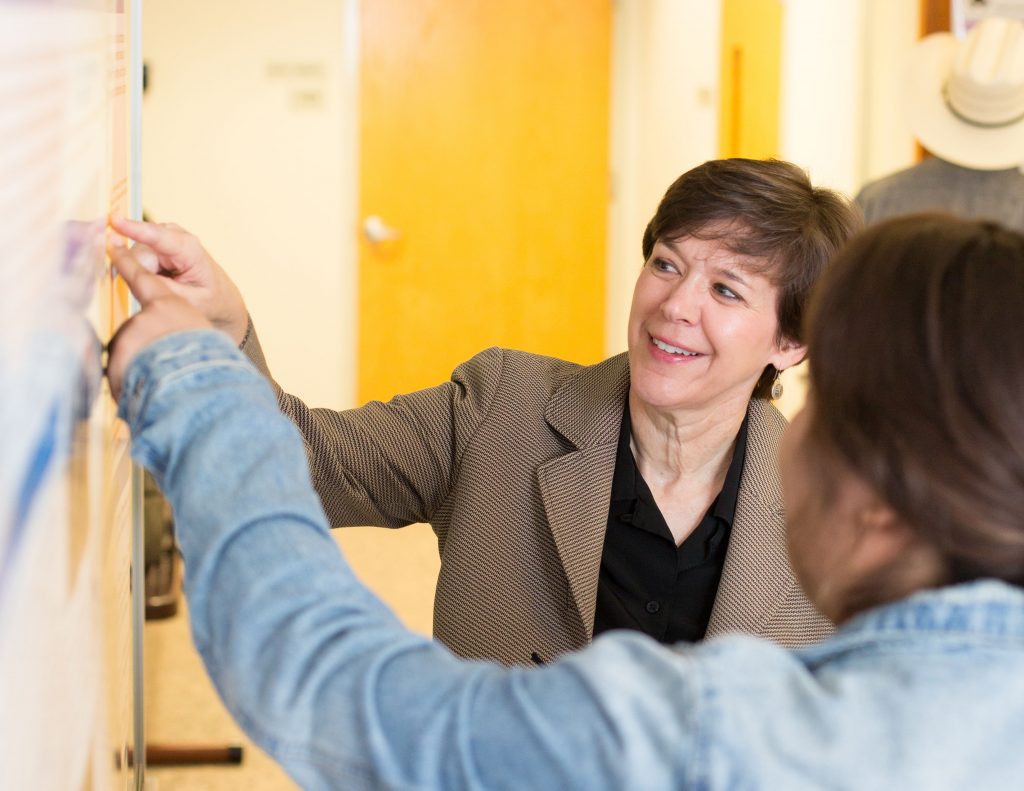Southwest Health Equity Research Collaborative investigators work to end the HIV epidemic in rural Oklahoma

Since her doctoral work more than 31 years ago, Northern Arizona University Regents’ Professor Julie A. Baldwin has been working to prevent human immunodeficiency virus, or HIV, in a unique way—through community-engaged, culturally centered interventions based on the specific needs in each community.
Baldwin, director of the Center for Health Equity Research (CHER) and principal investigator of the Southwest Health Equity Research Collaborative (SHERC), successfully approaches HIV prevention efforts, both nationally and internationally, by collaborating with a team of experts in a variety of fields—community members and mentors, health experts, anthropologists, epidemiologists and others—who all use their expertise to contribute to the project in some way through formative research, intervention development, implementation and evaluation to create a contextually and culturally relevant HIV prevention program.
In the latest project, Baldwin and a team from SHERC will join researchers from Purdue University, Oklahoma State University and Cherokee Nation Health Services on a project called “Ending the HIV Epidemic in Rural Oklahoma,” or e-HERO.
The goal of the yearlong e-HERO project, funded for almost $750,000, is to increase HIV and syphilis testing among sexual minority men and American Indian men in rural Oklahoma and link them to medical care and psychological services. They also hope to increase condom use and promote pre-exposure prophylaxis, or PrEP, uptake in Oklahoma, a state that is an Ending the HIV Epidemic initiative priority state through the Centers for Disease Control and Prevention.
Ending the HIV Epidemic in the U.S.: state-by-state
In 2019, the U.S. Department of Health and Human Services launched the Ending the HIV Epidemic initiative, which aims to reduce new HIV infections in the U.S. by 75% in five years and by 90% in 10 years. Sexual minority men residing in priority areas of the Ending the HIV Epidemic program have nearly 50% greater odds of contracting STIs compared to those residing elsewhere.
Oklahoma has the highest proportion of American Indians in the U.S. Similar to their sexual minority men peers, rural American Indian men have seen an increase in HIV incidence—where American Indian men now account for 9.3% of new infections in Oklahoma compared to 7.8% in 2016.
In 2019, Oklahoma had 370 newly diagnosed people with HIV infection. Residents under the age of 24 account for a quarter of new HIV, chlamydia, and gonorrhea infections.
Despite the high rates of HIV, less than 28% of rural Oklahomans have received an HIV test during their lifetime and only 5.7% during the past year, the lowest testing rate among the Ending the HIV Epidemic initiative states.
“Rural sexual minority men and American Indian men in Oklahoma experience many barriers to HIV and sexually transmitted infection (STI) testing, including worries about HIV-related stigma, low perceptions of risk, difficulty accessing and communicating with healthcare providers, and confidentiality concerns, requiring expansion of prevention and screening services,” Baldwin said. “For these reasons, men might be less likely to receive HIV prevention messaging, engage in routine testing, identify HIV testing resources, or receive comprehensive education as compared to their urban counterparts.”
Baldwin partnered with her colleagues Randy Hubach, director of the Sexual Health Research Lab at Purdue University and associate professor of Public Health; Denna Wheeler, director of Research and Evaluation and clinical associate professor at Oklahoma State University Center for Rural Health; and Jorge Mera, director of Infectious Disease of Cherokee Nation Health Services because of their extensive experience conducting HIV/STI prevention work in Oklahoma.
“The e-HERO project is a unique opportunity to advance public health and HIV prevention systems to be culturally responsive to the unique experiences of rural sexual minority men and American Indian men,” Hubach said.
Eliminating HIV in Oklahoma
As a citizen of the Cherokee Nation of Oklahoma and HIV/AIDS researcher, Baldwin has spent more than 35 years collaborating with Indigenous communities, colleagues at other universities, health care professionals, and community-based agencies to develop health equity programs.
From NAU, along with Baldwin, the e-HERO project team includes: Amanda Pollitt, assistant professor for the Department of Health Sciences and CHER; Amanda Hunter, postdoctoral scholar for the Center for Health Equity Research; Carly Camplain, senior research coordinator; and Grant Sears, research coordinator.
The researchers will focus on two Ending the HIV Epidemic initiative goals: HIV diagnosis and prevention. To effectively engage sexual minority and American Indian men in HIV screening and prevention, the researchers will use a multi-level approach:
- Offer Insti Multiplex HIV/syphilis duo self-testing kits.
- Establish mobile health programs called mHealth to support self-testing.
- Train peer mentors to deliver guided HIV sessions through telementoring.
- Offer links to local community-based organizations and providers.
The e-Hero researchers will first conduct in-depth interviews with providers and clinic managers from rural based clinics in Oklahoma and focus groups with clients. In order to increase HIV diagnosis and prevention, the e-HERO research team will create an HIV intervention program prototype that they will refine in partnership with a community advisory board comprised of rural sexual minority men, rural American Indian men, healthcare providers, community advocates, and other groups invested in ending HIV in Oklahoma.
The team will then implement a small randomized controlled trial with 100 rural sexual minority men and 100 American Indian men between 17-29 years old and offer them the prototype HIV intervention program versus a comparison intervention.
The HIV intervention program will include peer mentors who have with familiarity with local issues and rapport with community members in order to more effectively engage rural sexual minority and American Indian men in mobile health technology or mHealth.
“Our goal is to work with communities to create a more precise, culturally-informed intervention to better address the barriers to HIV/STI testing and prevention that rural men face,” said Pollitt. “In doing so, we hope to contribute to the elimination of HIV among men who are particularly at risk for the disease.”
SHERC (U54MD012388), is sponsored by the National Institute on Minority Health and Health Disparities (NIMHD).